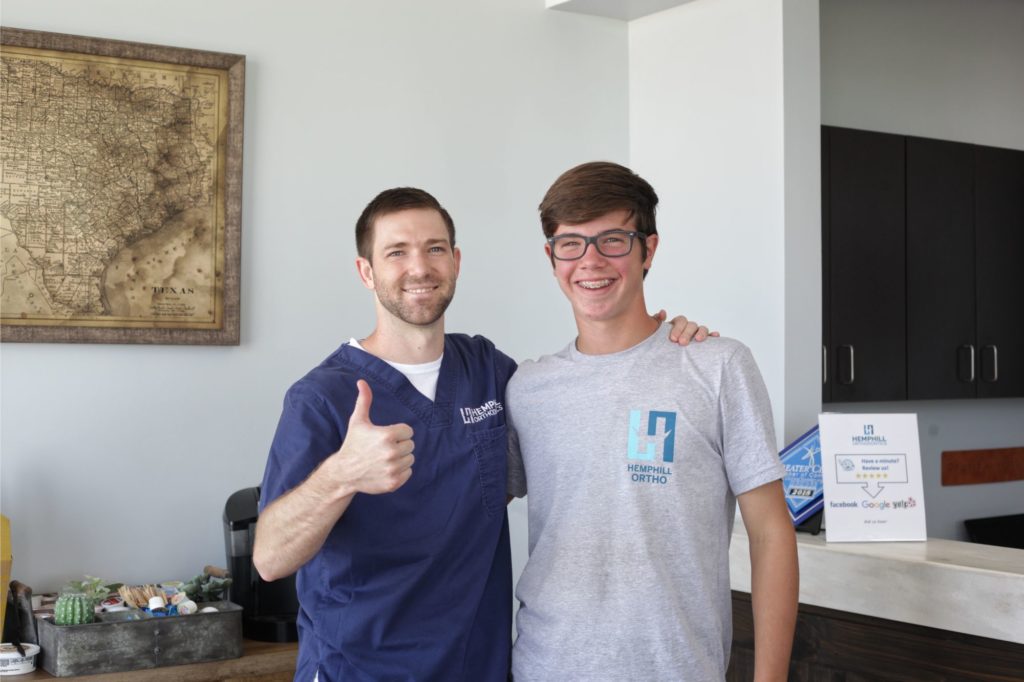Invest in Your Teen
The teen years (between the ages of 12 and 16) are the most common time for orthodontic treatment because most permanent teeth will be in place. Luckily, some new solutions work to make the treatment process much easier than ever before.
Teen Orthodontics
Experienced orthodontists like Dr. Hemphill will be able to easily recognize issues with spacing, crowding, bite, and alignment in this age range, and your teen’s bone and jaw structure are formed enough to allow orthodontic treatment to begin.
Some teens may have even started Phase I treatment at an earlier age, and are now following it up with full braces or other orthodontic treatment.

Common Smile Problems
Beyond outward appearances, untreated dental problems can have a lasting impact on your teen’s oral and overall health.
If you notice any of the following issues, we recommend a complimentary consultation with Dr. Hemphill at Hemphill Orthodontics, since they could be signs your teen may benefit from orthodontic treatment.
- Early, late, or irregular loss of their baby teeth
- Difficulty with chewing or biting
- Crowding or extra spacing between teeth
- Jaws that shift or make sounds
- Frequent biting of the cheek or the inside of the mouth
- Teeth that meet abnormally or not at all
- Jaws and teeth that are out of proportion to the rest of the face
- Protrusion of teeth
Bad Bites
Diagnosing and successfully treating certain bite problems can have short-term and long-term benefits. Problems classified as “bad bites” can often be minimized with the proper orthodontic treatment, including:
- Crooked or crowded teeth
- Missing or extra teeth
- An overbite or underbite
- Incorrect jaw position
- A disorder of the jaw joint
Smile Benefits
Straight teeth that respond well to orthodontic treatment carry a number of benefits, including:
- Being less prone to wear and tear, chipping, and tooth trauma
- Being easier to keep clean, helping to prevent tooth decay and cavities
- Reducing the chances of developing gum disease, which can result in bone loss, decay, and tooth loss
- Improving proper chewing and digestion of food
The Treatment Process
While creating a customized treatment plan for your teen, we might recommend an orthodontic appliance.
Here at Hemphill Orthodontics, we offer:
Metal Braces
Braces have come a very long way, even within the past decade. When many people think of braces, they think of extremely bulky metal brackets.
We don't use this type of bulky orthodontic appliance, and many of the new braces are lighter and more comfortable than ever before.
Ceramic Braces
Also known as clear braces, these work the same way metal braces do but feature brackets made of tooth-colored ceramic materials. They blend in with your teen’s smile, making them much less obvious.
Since ceramic braces are slightly more prone to breakage, and a little costlier than metal braces, they may not be suitable for everyone.
Invisalign®
The Invisalign system is made up of a series of fully customized, clear trays called aligners. These aligners are nearly invisible and totally removable.
Made of soft plastic, they provide a more comfortable orthodontic experience, with no friction or abrasions inside your teen’s mouth.
Each week your teen will switch their aligner for the next in the set. When your teen wears their aligners recommended 20-22 hours per day, your teen’s teeth will gradually move into the desired positions.
Invisalign works best for mild to moderate orthodontic issues, and may not be an option if your teen needs more serious treatment.
Teen Orthodontics FAQ
Make an Investment in Your Teen’s Future
Orthodontic treatment is an investment in your child’s future.
By scheduling a free consultation, Dr. Hemphill will be happy to discuss the benefits of treatment with both of you, as well as any of the risks with putting off or skipping treatment.
Although adults can successfully complete orthodontic treatment, a teen’s jaws and teeth can respond quicker to orthodontic treatment, shortening their total treatment time.
